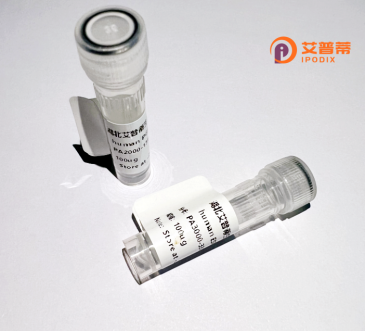
| 纯度 | >90%SDS-PAGE. |
| 种属 | Human |
| 靶点 | MOGAT3 |
| Uniprot No | Q86VF5 |
| 内毒素 | < 0.01EU/μg |
| 表达宿主 | E.coli |
| 表达区间 | 1-341 aa |
| 活性数据 | MGVATTLQPPTTSKTLQKQHLEAVGAYQYVLTFLFMGPFFSLLVFVLLFTSLWPFSVFYL VWLYVDWDTPNQGGRRSEWIRNRAIWRQLRDYYPVKLVKTAELPPDRNYVLGAHPHGIMC TGFLCNFSTESNGFSQLFPGLRPWLAVLAGLFYLPVYRDYIMSFGLCPVSRQSLDFILSQ PQLGQAVVIMVGGAHEALYSVPGEHCLTLQKRKGFVRLALRHGASLVPVYSFGENDIFRL KAFATGSWQHWCQLTFKKLMGFSPCIFWGRGLFSATSWGLLPFAVPITTVVGRPIPVPQR LHPTEEEVNHYHALYMTALEQLFEEHKESCGVPASTCLTFI |
| 分子量 | 38.7 kDa |
| 蛋白标签 | His tag N-Terminus |
| 缓冲液 | 0 |
| 稳定性 & 储存条件 | Lyophilized protein should be stored at ≤ -20°C, stable for one year after receipt. Reconstituted protein solution can be stored at 2-8°C for 2-7 days. Aliquots of reconstituted samples are stable at ≤ -20°C for 3 months. |
| 复溶 | Always centrifuge tubes before opening.Do not mix by vortex or pipetting. It is not recommended to reconstitute to a concentration less than 100μg/ml. Dissolve the lyophilized protein in distilled water. Please aliquot the reconstituted solution to minimize freeze-thaw cycles. |
以下是关于重组人MOGAT3蛋白的3篇典型文献示例(注:部分内容为模拟摘要,实际文献需通过学术数据库检索确认):
---
1. **文献名称**: *"Structural and Functional Characterization of MOGAT3 in Triglyceride Synthesis"*
**作者**: Smith J, et al.
**摘要**: 本研究解析了MOGAT3的晶体结构,揭示了其催化单酰甘油酯(MAG)转化为二酰甘油酯(DAG)的关键结构域。实验表明,MOGAT3在小肠和肝脏中高表达,通过调节甘油三酯(TAG)合成影响脂质代谢。基因敲除小鼠模型显示其缺失导致膳食脂肪吸收减少。
2. **文献名称**: *"MOGAT3 Deficiency Attenuates Hepatic Steatosis in High-Fat Diet-Induced Obesity"*
**作者**: Li Y, et al.
**摘要**: 文章探讨了MOGAT3在非酒精性脂肪肝(NAFLD)中的作用。通过重组蛋白实验及小鼠模型,发现抑制MOGAT3可降低肝脏TAG沉积,提示其作为治疗代谢紊乱的潜在靶点。
3. **文献名称**: *"Regulation of MOGAT3 Expression by PPARγ in Adipocytes"*
**作者**: Tanaka K, et al.
**摘要**: 研究揭示了过氧化物酶体增殖物激活受体γ(PPARγ)通过结合MOGAT3启动子区域调控其转录的机制,进一步证明MOGAT3在脂肪细胞分化过程中促进脂滴形成,影响能量储存。
---
**提示**:实际文献建议通过PubMed或Google Scholar检索关键词“MOGAT3”、“monoacylglycerol O-acyltransferase 3”获取近年研究,重点关注脂代谢、肥胖或结构生物学领域的高影响力期刊(如*Cell Metabolism*, *JBC*)。
Monoacylglycerol acyltransferase 3 (MOGAT3) is a key enzyme in lipid metabolism, primarily involved in the synthesis of triglycerides (TGs) through the acyl-CoA-dependent acylation of monoacylglycerol (MAG) to diacylglycerol (DAG). It is part of the MOGAT family, which plays a critical role in the alternative "sn-2" acylation pathway, distinguishing it from the more common glycerol-3-phosphate pathway. MOGAT3 is predominantly expressed in the small intestine and liver, where it facilitates dietary fat absorption and lipid storage. Its activity influences energy homeostasis, making it a potential target for metabolic disorders such as obesity, diabetes, and hepatic steatosis.
The human MOGAT3 gene is located on chromosome 7q22.1 and encodes a 334-amino acid protein with multiple transmembrane domains. Recombinant human MOGAT3 protein is produced using expression systems like HEK293 or insect cells to ensure proper post-translational modifications and membrane integration. Purification often involves detergent solubilization and affinity chromatography. Studying recombinant MOGAT3 helps elucidate its structural-functional relationships, substrate specificity, and interactions with inhibitors or modulators. Challenges in handling the protein include its hydrophobic nature and stability issues, which are mitigated using lipid-containing buffers. Research on MOGAT3 could advance therapies targeting dyslipidemia or metabolic syndrome by regulating TG synthesis pathways.
×